
There is growing focus on an organization that Supreme Court justice nominee John Roberts claims he cannot remember if he joined or not: the Federalist Society. We speak with Alfred Ross of the Institute for Democracy Studies who uncovered John Roberts’ membership in the right-wing organization. [includes rush transcript]
Ever since President Bush announced in prime time that his nominee to the Supreme Court would be John Roberts, momentum has been building for a showdown at Robert’s confirmation hearings scheduled for September. At this point it seems unlikely that Roberts is in any great risk of not being confirmed, but Democrats have made clear that they intend to ask him to publicly state his views on some of the most politically divisive issues on Capitol Hill—most prominent among them, a woman’s right to choose.
The White House has painted Roberts as a candidate made for the Supreme Court and his resume has gained praise from both sides of the aisle. But John Roberts has left a rather short paper trail. What we do know is drawn largely from his career as a lawyer, where he has defended Operation Rescue, has made the argument that Roe v. Wade has no constitutional basis. We know that he advised Florida Gov. Jeb Bush during the 2000 election showdown and that as a Bush appointed judge, he sat on a 3 judge panel that a week and a half ago handed the Bush administration a key propaganda victory by allowing military trials to go ahead at Guantanamo instead of giving prisoners access to the rights guaranteed under the US constitution. We also know that he is described as a solid conservative who worked for President Bush’s father and Ronald Reagan. We also know that the Bush administration lobbied conservative groups to support Roberts for a year leading up to his nomination.
As the TV ad war continues, the Roberts story has taken a new twist. There is growing focus today on an organization that Roberts claims he cannot remember if he joined or not: the Federalist Society. Roberts and the White House say the nominee has no recollection about his possible membership. But yesterday, the Washington Post reported that it had obtained a 1997-98 Federalist Society leadership directory listing Roberts, then a partner in a private law firm, as being a steering committee member in the group’s Washington chapter.
On Monday, Roberts declined to say why he was listed in the directory when asked by a reporter about the discrepancy during a morning get-acquainted meeting with Sen. Dianne Feinstein. White House spokesperson Scott McClellan was asked about Roberts and the Federalist Society at the daily press briefing.
- White House press briefing, July 25, 2005.
We are joined in our Washington DC studio by the man who uncovered John Roberts membership in the Federalist Society. Alfred Ross is the founder and president of the Institute for Democracy Studies.
- Alfred Ross, founder and president of the Institute for Democracy Studies.
Transcript
AMY GOODMAN: White House Spokesperson, Scott McClellan, was asked about Roberts and the Federalist Society at the daily press briefing.
REPORTER: It was reported, as you know, that he was in the Federalist Society, which is an important legal group in conservative — on the conservative side. Then the White House said, 'No, it was not the case.' And now it appears that he was part of the leadership group. What is the real story here?
SCOTT McCLELLAN: He has no memory of ever joining or paying dues to the Federalist Society. He has no recollection of that. He has participated in events and panel discussions. He has given speeches at Federalist Society forums, but he doesn’t have any recollection of ever paying dues or joining the organization.
REPORTER: Isn’t that kind of a simple thing to nail down? Prior to now?
SCOTT McCLELLAN: Well, David, he has answered this over the last few years. The issue has come up, and he certainly has participated in some of the events that they have sponsored or that they’ve hosted, but he just doesn’t have any memory of ever paying any dues to the organization.
AMY GOODMAN: White House Press Secretary Scott McClellan being questioned Monday at the White House. Meanwhile, another man with close ties to the Federalist Society, Timothy Flanigan, is on Capitol Hill today, where his confirmation hearings begin in front of the Senate Judiciary Committee. He has been nominated as Deputy Attorney General. We are joined now in Washington, D.C. by the man who uncovered John Roberts’s membership in the Federalist Society. Alfred Ross is founder and President of the Institute for Democracy Studies. Welcome to Democracy Now!
ALFRED ROSS: Well, Amy, it’s a pleasure to be here.
AMY GOODMAN: It’s good to have you with us. Can you tell us about what you know, what evidence you have that John Roberts is a member of the Federalist Society, and then, of course, what the Federalist Society is?
ALFRED ROSS: Well, Roberts, whether he’s paid his dues or not, was prominently listed in the 1997/1998 leadership directory published by the Federalist Society itself. So it is very difficult to believe that he didn’t have any membership. He was on the Steering Committee. The important question is not whether he paid dues as a member or not. The question really at stake here is where does Roberts and his Federalist Society cronies plan to steer our ship of state. If one looks at the history of the Federalist Society, which was established at the inspiration of Robert Bork in the early 1980s, their entire trajectory has been to move our judicial system in an extremely radically right wing direction.
In order to effectuate this, the Federalist Society has established 15 practice groups which you can find on their own website which is fed-soc.org. These 15 practice groups are busy developing new legal theories for every area of American jurisprudence, from civil rights law to national security law, international law, securities regulations law, and so on. And if one goes through the publications of their practice groups, one can only gasp not only at the breadth of their agenda, but the extremism of their ideology.
It is not insignificant that today Timothy Flanigan will have hearings at the Senate Judiciary Committee on his nomination to be Deputy Attorney General of the United States. In the same leadership directory that lists John Roberts on the Steering Committee to the Federalist Society, it lists Timothy Flanigan on the Program Committee of the Federalist Society. And both men have their own personal track records in the right wing of American jurisprudence. In 1987 the Senate Judiciary decided that Robert Bork’s ideology was so far outside the mainstream of American jurisprudence that he was not fit to serve on the Supreme Court. The same kind of strict scrutiny should be applied to John Roberts who is on the Steering Committee of the organization that Robert Bork inspired.
AMY GOODMAN: So the Federalist Society founded under the first term of Ronald Reagan?
ALFRED ROSS: Yes, it was established in early 1980s, on their website, they claim 1982.
AMY GOODMAN: And how did you get a hold of the documents? Here you have The Washington Post first doing a piece, saying that John Roberts is a member of the Federalist Society, then they retracted that, and now yesterday another piece saying that they were wrong, that in fact they were right the first time that he was a member.
ALFRED ROSS: Well, we were able to obtain the document, which is not particularly secret, although it was their own internal leadership directory. I mean, it has a very glossy cover, it must have had hundreds, if not thousands of copies made and distributed all across the country. My recollection is that someone handed it to me at one of their meetings, which anyone can go to. The question is not the document itself, the issue is why did the White House issue this unprecedented series of calls to the national media to try to cover up his membership? And the answer to that question is that the White House does not want the Senate Judiciary Committee or the American people to understand the full agenda of the Federalist Society. Timothy Flanigan was one of the people who signed onto the Supreme Court brief in 2000 in Bush v. Gore to try to get this born-again Christian, George Bush, into the White House. The goal was not just to get Bush into the White House. The goal was to use the Bush Administration to implement the wide-ranging agenda of the Federalist Society, and it wasn’t coincidental that along with Flanigan on the cover of the brief was the name of Ted Olson, Chair of the Federalist Society in D.C., who then became Solicitor General of the United States and argued strenuously against affirmative action and other programs while he was Solicitor General.
AMY GOODMAN: Timothy Flanigan, the man who is before the Senate Judiciary Committee today, nominated as Deputy Attorney General of the United States.
ALFRED ROSS: Yes, I think it’s important for the Senate Judiciary Committee to inquire into the jurisprudence of the practice groups of the Federalist Society. But their agenda goes beyond just the substantive law of the different practice groups. As the right wing legal groups begin to push their theories of devolution, basically states’ rights, moving more of American law into the states, the Federalist Society recently launched a state judicial selection project so they could move not only their judges into the federal courts, but also into the state courts. If they accomplish their agenda of dominating the federal and state courts, they will have an effective stranglehold on the American legal system.
The man who was chosen to head the Federalist Society state judicial selection project is a chap named Clint Bollick, who wrote a book called The Affirmative Action Fraud and edited another book called Unfinished Business: Civil Rights Strategy For the Next Century. Again, it is not coincidental that the introduction to Unfinished Business was by Charles Murray, who wrote The Bell Curve, arguing basically that African Americans had a lower IQ than white people, and therefore were basically forever limited in how far they should get, making affirmative action programs useless.
AMY GOODMAN: We’re talking to Al Ross, head of the Institute for Democratic Studies, who got a hold of the document that said that John Roberts, the Supreme Court nominee, was on the — in the directory of the Federalist Society in 1997/1998. Now, John Roberts claims he cannot remember if he joined or not. Your response to that, Al Ross?
ALFRED ROSS: Well, we can’t yet do an MRI scan of his brain to see whether there is a memory cell there or not. But it would be very difficult, indeed, for him to deny his association with the organization. How does he get to be listed as a member of the Steering Committee? And I suppose the Senate Judiciary Committee could inquire and ask for whatever correspondence existed. But again the important point here is not this memory lapse, which is strange given his reputation as having one of the more spectacular memories in the legal community in Washington, D.C., but again the growth of this organization within the Bush Administration and the implementation of its views.
The Inspector General of the Department of Defense had been also with Roberts on the Steering Committee of the Federalist Society, and Paul Clement, the current Solicitor General of the United States chaired the litigation practice group for the Federalist Society. Alex Acosta, another Federalist Society member and leader was recently deployed to be the U.S. Attorney in the critical state of Florida having served as Assistant Attorney General of the United States for Civil Rights.
So Roberts can deny it, and people can decide whether or not to believe him. But it would be hard for him to deny his association with a group of lawyers furthering the agenda of the Federalist Society. Before the election of 2000, we actually published a brief on the Federalist Society, which people can obtain by contacting our office, the Institute for Democracy Studies in New York. But the agenda is there, it’s on their website. It ’s clear that Roberts was on the Steering Committee. Whether his partners at Hogan and Hartson realize that he was there feeding information to the Federalist Society and presumably trying to recruit and helping develop their agenda.
AMY GOODMAN: Al Ross, why the title Federalist Society? Why the name?
ALFRED ROSS: Well, it’s interesting. At one of their recent conferences at Yale Law School, which was opened to anyone who wanted to attend, they actually chuckled about the fact that originally they were going to name it the Anti-Federalist Society, but it didn’t sound very good, so they called it the Federalist Society. The point here is the — this organization of extremist lawyers really has no principles about what they call themselves, whether they remember if they were members of the Steering Committee or not. The point is whatever sells and moves their agenda forward, they’re prepared to use. And this debate over Federalist or the Anti-Federalist is really illustrative of the underlying cynicism and ruthlessness of this organization.
AMY GOODMAN: Are you saying that the White House called The Washington Post to get them to retract that Roberts was a member of the Federalist Society, which then they did and now with the documents they are reasserting that he was?
ALFRED ROSS: Well, that’s clear. They not only called The Washington Post but they called a number of other prominent newspapers across the country. And the reason why they were doing it is they very much did not want the Senate Judiciary Committee or the American people to unravel the thread of the Federalist Society and begin to discover the incredible penetration of its membership throughout our judicial system and, more importantly, the underlying ideology that the group represents. Roberts himself has only sat on a federal court for basically about two years, which is amazing for someone to be appointed to the Supreme Court. And the question is how does one begin to access his underlying ideology? And this is a very important way for the Senate Judiciary and the American people to understand Roberts, Flanigan, and the Bush administration’s goals for our legal system.
AMY GOODMAN: Al Ross, while you may not agree with the Federalist Society, apparently there are tens of thousands of members. Why doesn’t, with conservatives in the ascendancy in the government, why don’t they just say, 'Sure, he represents our ideology? What is wrong with that?'
ALFRED ROSS: Well, it’s interesting. A number of conservatives actually were upset with the White House for trying to cover up the connection because they’re quite proud of it. But I think the issue here is the, I believe, correct awareness by the Bush administration’s spin masters, that the majority of the American people would not support the ideology of the Federalist Society, even though admittedly thousands of right wing lawyers are very glad to further their agenda.
AMY GOODMAN: Finally, do they take a stance on abortion?
ALFRED ROSS: Well, officially the Federalist Society, as an organization, doesn’t take a stance on anything. But that’s rather a sham. Throughout their literature and at their forums, they endorse not only anti-abortion ideology, but extremist ideology on civil rights, national security law, telecommunications law, and every other issue you can possibly imagine.
AMY GOODMAN: Alfred Ross, I want to thank you very much for being with us, founder and president for the Institute for Democracy Studies based in New York. Thanks for joining us.
ALFRED ROSS: Thank you very much, Amy.

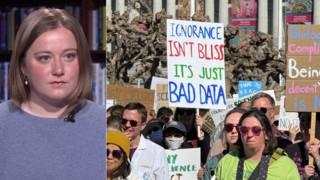
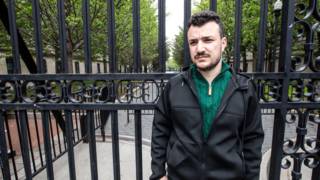
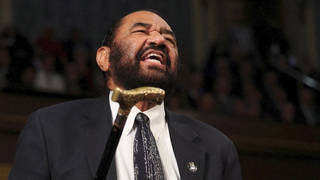
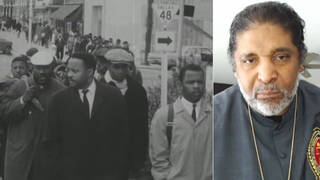





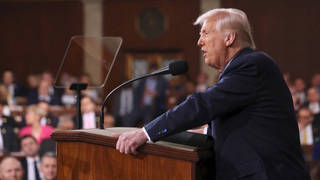
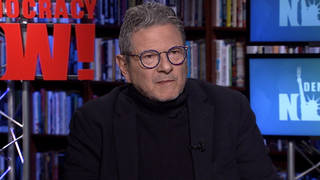
Media Options